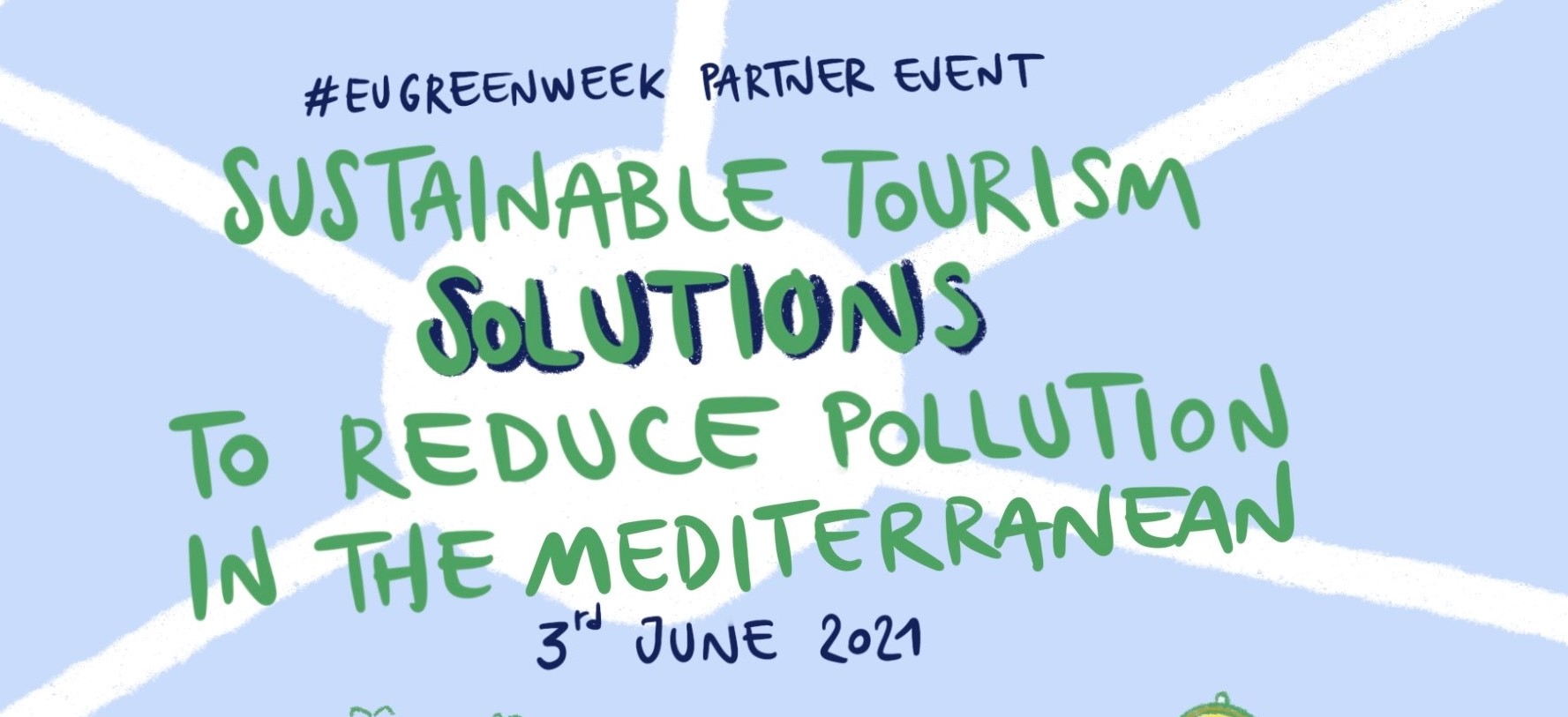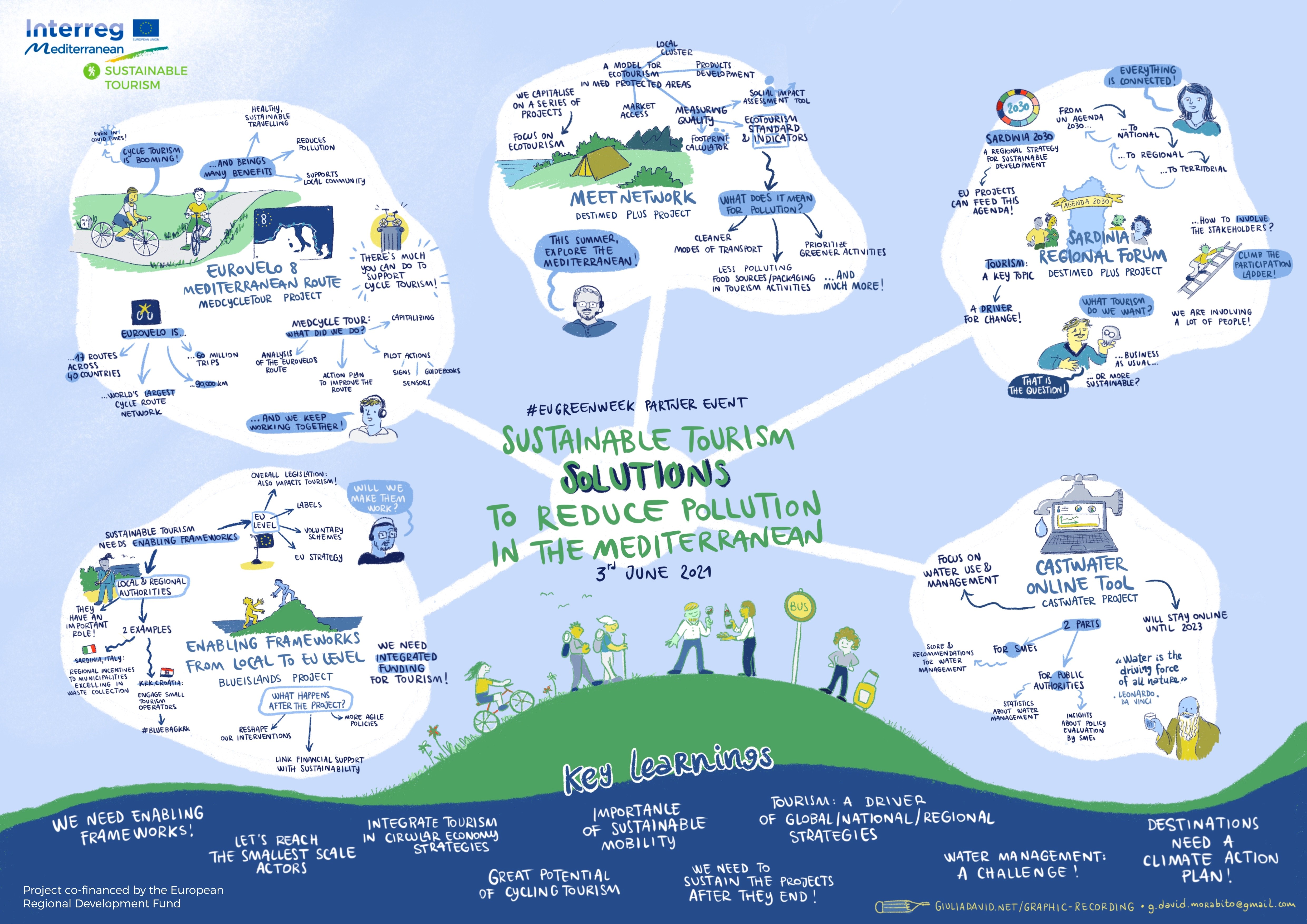
REPORT: Sustainable Tourism solutions to reduce pollution in the Mediterranean
-
24/06/2021
-
Members
NECSTouR organised a workshop on June 3rd during the last EU Green Week in the framework of the Interreg MED Sustainable Tourism horizontal project. Partners and experts from the Interreg MED thematic community shared outputs and policy recommendations.
The goal of this EU Green Week partner event was to present solutions aiming at reducing pollution like promoting eco-tourism as a driver of resource-efficiency (IUCN-Med), cycle tourism influencing regional and national policies (ECF), reducing pollution during the tourist season through good waste management (ACR+), a participative sustainable development regional forum (Region of Sardinia) and an online tool for better water management for regional authorities and the tourism industry (Municipality of Rethymno). The event was moderated by Thomas Guillot, project officer at NECSTouR, while Cristina Nunez, managing director, provided context and conclusions.

The Association of Cities and Regions for Sustainable Resource Management (ACR+) is the dissemination leader of the BLUEISLANDS project and, above all else, an international network of decentralized public authorities working on sustainable resources management and pushing for circular economy loops.
Francesco Lembo, managing director of ACR+, presented ways to enable “frameworks to create and integrate the appropriate funding” and particularly how to help the local SMEs and how does those frameworks fit into regional and destinations recovery plans. Mr. Lembo explained the importance for a good communication to reach out to the smallest actors of the sector, taking the advantage of the closeness of actors at destination level. ACR+ is coming up with incentives, labels, strategies and legislations (inspired by the BLUEISLANDS projects) to target the reduction of pollution during the tourist season through good waste management.
Francisco Lembo’s presentation is available here.
“Cycling routes can provide 7 billion euros in revenue. So, it’s not only sustainable but also lucrative, it’s healthy and it helps decarbonize the region”. Ed Lancaster, the director of the European Cyclists Federation (ECF) presented the Eurovelo 8 - Mediterranean Route and the benefits of cycling tourism. ECF highlights the importance of sustainable mobility in the last mile and the need to combine cycling with public transports, in full slow-tourism mode.
As the European partner of MEDCYCLETOUR, M. Lancaster shared interesting tips on how to ensure sustainability after the project ends with, for example, cascade funding using different financial instruments that will apply as the route is maturing. The goal of the MEDCYCLETOUR project was to use the EuroVelo 8 - Mediterranean Route as a tool to influence regional and national policies in favour of a sustainable and responsible tourism, providing transnational solutions, like product diversification and infrastructure, in coastal areas across the Mediterranean.
ECF is inviting everyone to take part in the EuroVelo & Cycling Tourism Conference in October in Barcelona.
Ed Lancaster’s presentation is available here.
The next project, DESTIMED PLUS, got two speakers instead of one. For Arnau Teixidor, Ecosystem Programme Officer at The Centre for Mediterranean Cooperation of the International Union for Conservation of Nature (IUCN-Med), “there is ways to explore natural areas in a meaningful way that doesn’t contribute to over-tourism”.
DESTIMED PLUS is promoting eco-tourism as a driver of resource-efficiency, encompassing all phases of the product cycle, from conception to commercialization. M. Teixidor demonstrated how they deliver good products, following the visitors’ appetite for safe and sustainable experiences.
Their main tool is the MEET Network, a non-profit association supporting protected areas to develop high-quality ecotourism benefiting local communities and enhancing conservation of natural areas. The network capitalises on the work done in previous EU projects including an ecotourism standard, and monitoring tools such as the Ecological Footprint Calculator, developed by the Global Footprint Network, allowing destinations to measure the environmental impact of their tourism activities. IUCN-Med is one of the founders of the MEET network, now supporting dozens of protected areas.
Arnau Teixidor’s presentation is available here.
The Autonomous Region of Sardinia always share the best practices from the NECSTouR network when it comes to mainstream tourism as a sustainable regional development strategy as part of the 2030 Agenda for Sustainable Development.
Emanuela Manca from the Region’s Department of the Environment presented their last creation: the Sustainable Development Regional Forum, involving more than 2300 stakeholders through a participated process aiming at downscaling some of the 17 Sustainable Development Goals, like circular economy and sustainable tourism. Mrs. Manca presented how the region of Sardinia is embracing the project tools from DESTIMED PLUS to measure their performance in policymaking.
Emanuela Manca’s presentation is available here.
Vasileios Myriokefalitakis from the Municipality if Rethymno (Crete) presented the CASTWATER online tool from the eponymous project. An online tool addressed to both tourism sector SMEs and public authorities in the Mediterranean area to give them the support to understand, compare, assess, and rate their performance on water efficiency and water management. The tool will be exploited until the end of 2023.
Water management is a key challenge for tourism authorities and the tourism industry, especially in islands and coastal destinations like Crete. Not only to reduce the environmental impact but also to provide a healthier environment for everyone: tourists and inhabitants. A concern not new in the municipality, Cristina Nunez gave the example of a nearly zero energy hotel (NEZEH) in Rethymno.
Vasileios Myriokefalitakis’ presentation is available here.
Cristina Nunez, managing director of NECSTouR, concluded by saying the event gave the network and the community ideas of what regions and countries can add in their recovery plans to transform them into climate action plans through the greening of destinations.
As the Brussels-based territorial antenna of the Sustainable Tourism Community, NECSTouR vowed to move-on with the EU-territorial dialogue to put sustainable tourism as the top of the discussion. We highlighted two occurrences.
- The council approved a set of conclusions for Tourism in Europe for the Next Decade “for an economically, environmentally and socially sustainable and resilient tourism sector”.
- The Commission is working towards the Agenda for Tourism of Tomorrow 2050. It will be discussed during the Slovenian presidency of the EU, starting in July.